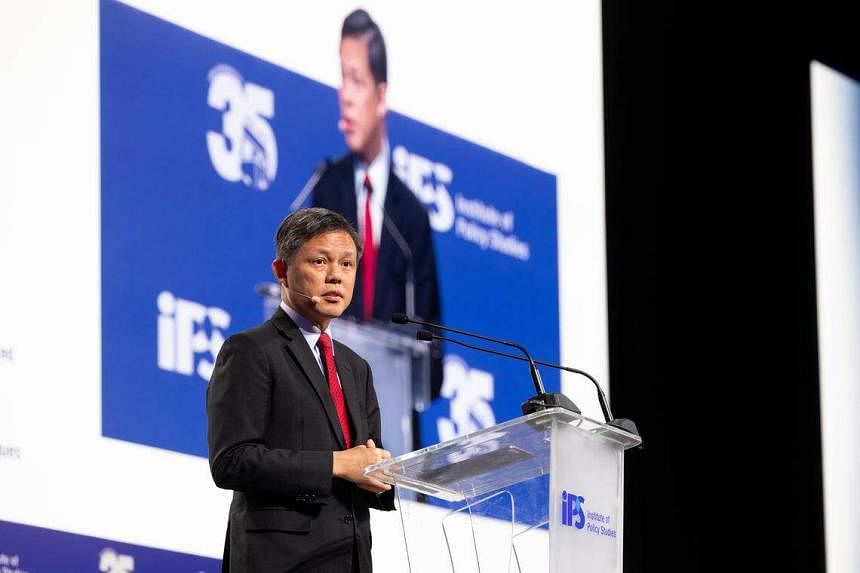from straitstimes.com:
MOE will broaden Edusave Award to recognise students beyond academic performance
Education Minister Chan Chun Sing spoke of the need to redefine success and meritocracy at the Institute of Policy Studies conference on June 12, 2023. PHOTO: LIANHE ZAOBAO
Amelia Teng
Education Correspondent
UPDATED
13 JUN 2023, 12:31 PM SGT
FacebookTwitter
SINGAPORE – The Edusave Award, which is given to students to motivate them to do well, will be broadened to recognise those who have contributed to their schools and society, said Education Minister Chan Chun Sing on Monday.
The award given out by the Ministry of Education (MOE) has traditionally been awarded to students based on academic excellence, he said. Over time, it has progressed to cover other aspects such as co-curricular activities (CCAs).
Speaking during a panel discussion on meritocracy at the Institute of Policy Studies’ 35th Anniversary Conference, Mr Chan said: “I’d like to see Singapore evolve into a society whereby we can find success not just by our own achievements, but instead by our contributions.
“Regardless of one’s station in life, whether we are rich or poor, whether we are academically inclined or otherwise, we all can make a contribution. And your contributions must be commensurate with your abilities.”
Responding to concerns about the entrenchment of alumni networks, Mr Chan alluded to plans to cluster schools together, to encourage alumni to contribute beyond their own communities.
“I have appealed to some of the alumni of the illustrious schools to go and serve on boards, on school advisory committees beyond your own boards, not just to give them ideas, but to help them to open up new networks and new opportunities,” he said.
“Instead of schools competing against one another, we will pair up schools or have clusters of schools working together on different CCAs for people to build the social networks and to share the social capital.”
Mr Chan was speaking on the need to redefine success and meritocracy, in the context of new challenges for Singapore and concerns about growing disparities in society.
“Success in Singapore must be a team sport. It is not just about each one individually running our own races,” he said.
Rather, he said, meritocracy must be about collective contributions from different members of society to the best of their abilities beyond personal achievements.
In a speech at the event held at Sands Expo and Convention Centre, Mr Chan said: “Meritocracy has helped Singapore succeed in the last 50 years, but unless we consciously keep strengthening the system and avoiding the pitfalls, it may not continue to do so for the next 50 years.
“But just because meritocracy can be flawed, like any other system... does not mean we should give it up altogether.”
The question then is how meritocracy can help Singapore to be even more relevant, competitive and cohesive going forward, he said, by attracting the best people and ideas, finding the best of diverse talents, and respecting and rewarding different abilities.
“Most importantly, meritocracy must be combined with the right values – gratitude for what we have received and compassion towards those who have not had these advantages in life and a collective sense of responsibility for us to uplift everyone together,” he said.
On the panel with Mr Chan were Associate Professor Daniel Goh from the National University of Singapore (NUS), and Associate Professor Jason Tan from the National Institute of Education, who spoke on a range of issues – from the role of parental involvement in educational success, to the need for more inclusive growth.
“The paradox of meritocracy is that perfect equality can lead to growing inequalities, if we do not ensure equitable baselines for everyone to unlock their skills and talents for performance,” said Prof Goh, who is also vice-dean (special programmes) at NUS College.
More can be done to encourage broad-based school admissions and outreach by removing obstacles, including psychological ones, that may hamper students applying to schools, he said, adding that alumni privilege could also be removed during admissions.
Prof Tan added: “We need to think about the ways in which sometimes those who have succeeded as a result of current or past policies are therefore better placed to secure an advantage for their own children.“It’s only natural for many parents to think that they need to try their very best, in order to help their children stay ahead and acquire more merit.”
This points to the uneasy balance between natural tendencies to look out for one’s own interests, and considering the greater public good, he said.
“The issues involved (in meritocracy) are highly emotive issues for any of us. This is obviously because it’s very much about human hopes and dreams,” he said.






















































